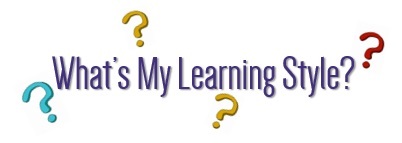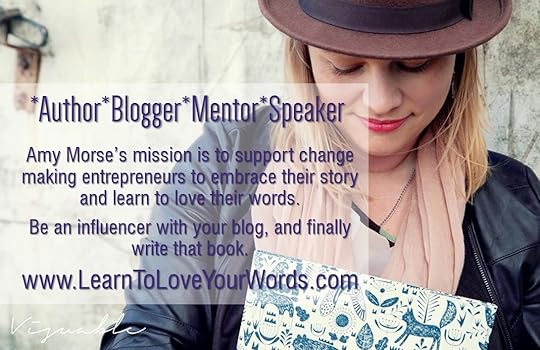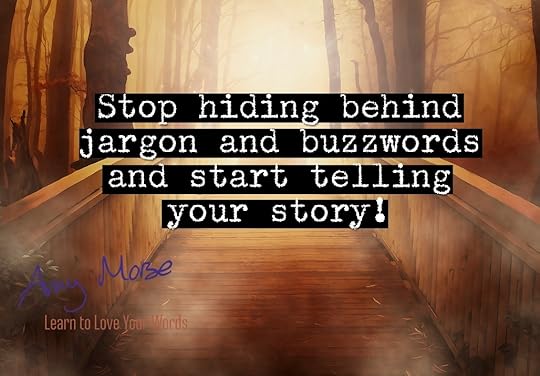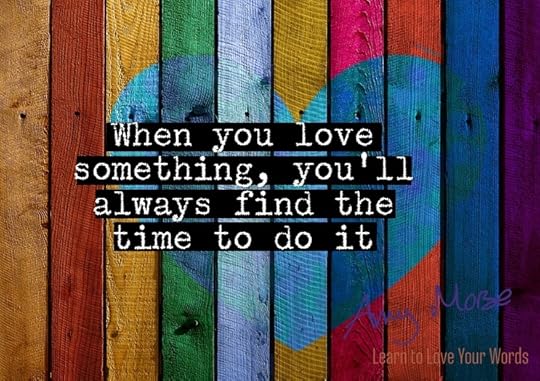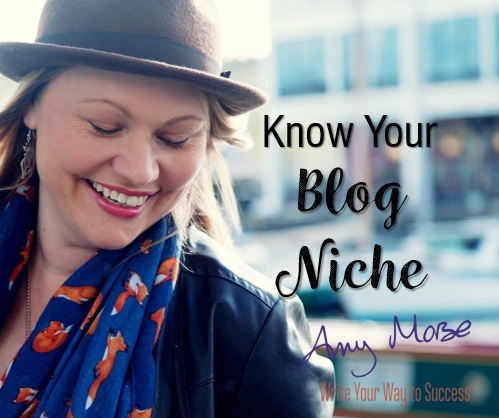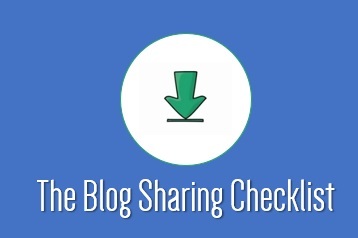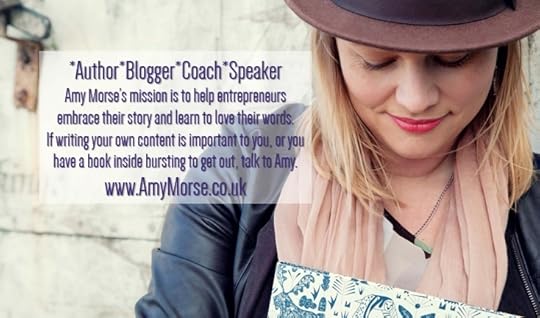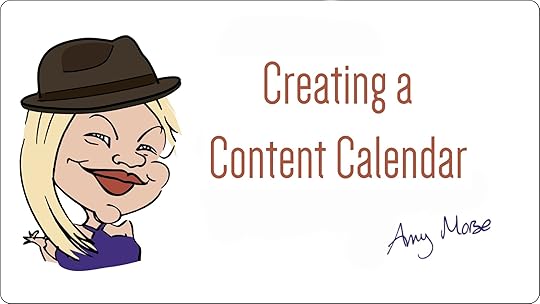Amy C. Fitzjohn's Blog, page 24
May 14, 2018
What’s Your Learning Style?
We all experience the world in different ways, learning as we go.
Are you a hugger? Or shy away from physical contact?
Do you read books? Or haven’t you read a book since school?
Is your perfect relaxation watching a movie, or do you prefer listening to music?
We all have different preferences to recieve information.
Some of us like to watch something then copy it.
Others will read about it and write about it.
Podcasts and music sink in for some and others need to ‘feel’ and ‘experience’ things to understand them.
These are our learning styles and we’re all a bit different. There are various academic models developed by psychologists, but the most commonly used is Neil Fleming’s VARK model.
The Four VARK Learning Styles
We all have degrees of preference for each of the styles:
Visual
People that like to watch something to learn about it. Most of us have a preference for this (60%), which is why pictures and video are good for us.
Top Tip: Always have an image on your blogs to draw people in.

Aural (Audio)
These are people who need to hear information to absorb it. They love podcasts and audio books.

Readers/Writers
They like to read information and write things down to retain it. This is often how we are conditioned to learn through school, so many of us fall into this by default and out of habit. Especially those of us who’ve studied at higher levels of education.
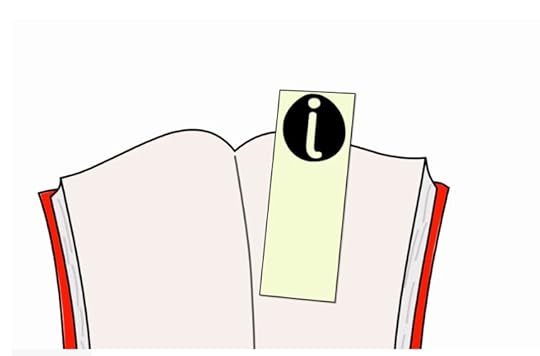
Kinaesthetic
These are the feelers. People who need to touch and expereince things. They like textures and you can often spot a kinaesthetic person because they’re a hugger and wear fluffly and soft clothes.

All of us are on the scale of these styles somewhere.
If you have ever been on any train the trainer training you’ll be familiar with the VARK model. When I was training to be a trainer (more years ago than I care to recount!) this was my favourite of the different styles we learned (Kolb and Honey & Mumford are also well known ones.).
What Is Your Learning Style
You can take a quick test here to find out what learning styles you prefer.
I’m VRKA – I like to see something (V), then write it down and read it later (R), then I like to try it for myself (K), and then be told to do it (A).
You may hear people say things like “blogging is dead, non one reads”.
Well, this simply isn’t true.
Just because video (V & K) and images (V) are popular online does not mean you should ignore the other ways to present information (R & A). Besides, the Googlebot needs words to chew through for SEO (Search Engine Optimisation) purposes, the algorythm can’t ‘read’ a video or an image unless you use words to describe it. We still type words into search engines to find what we want, then we may self-select the ‘Video’ or ‘Image’ tab after.
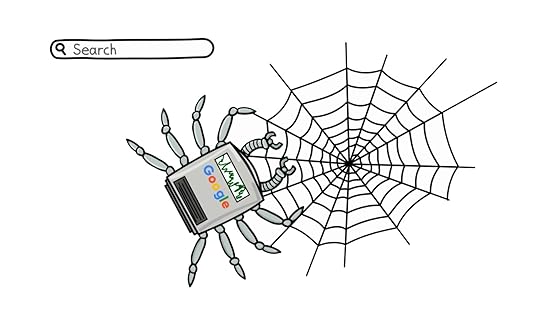
Why Written Blogs Are Important
Another consideration is that sometimes, we don’t want to sit through a video in the hope that it’ll answer our question. There are only so many ‘people-talking-into-their-phones-from-the-front-seat-of-their-car’ videos you can bear to watch! And, if you are anything like me, when you watch a video and get interupted by an advert part way through (have you noticed how You Tube vids have the advert in the middle now? How rude and annoying is that!) you stop watching and miss the rest of the content.
Sometimes we don’t have the bandwidth or the signal to buffer a video. Maybe we’re in a quite place and have no headhones to listen in? Or, we just want to copy and paste a quote from a piece of text.
My Top Tip:
Use a variety of written, visual, video and audio content on your blogs. Not only is this better for your readers, it’s better for Google and it’s more interesting for you!
I know I could be considered biased, but words are most definately not dead!
Does your blog have a distinctive voice and style?
Does it reflect your business?
Join me in conversation for top tips and insights to ‘Blog With Style’ in this FREE Webinar:
GET MY WEBINAR TICKET!
The post What’s Your Learning Style? appeared first on Amy Morse.
May 11, 2018
How Controversial Should My Blogs Be?
Very few of us set out to deliberately upset others. When we do so unintentionally it can be mortifying. But what about being deliberately contrary or controversial?
Where are the limits?
Find Your Limit
Telling someone where to establish their own boundaries and how controversial to be is a little like defining the length of an unseen piece of string!

Only you can decide where your boundaries lie. You are the only one who knows how vulnerable and how personal you want your public face to be.
Show vulnerability but know your boundaries – and once in a while, push them a little to see where they take you. You might be pleasantly surprised by the reaction you get!
Sharing your vulnerability, showing the world that you are human too and your life isn’t perfect is part of your story, it’s part of who you are an why you are where you are today. If nothing else, it can be extremely cathartic to write about it, to share it, to be heard.
Share your vulnerability, but be prepared for others to disagree, and even attack you for it.
You have no control over what someone else thinks of you, just how you react to them. You can’t force your ideas, assumptions and opinions on someone else, but you can control how you present your case and be persuasive without being aggressive or disrespectful.
Not everyone who responds will be as respectful as you are, but don’t let those few haters ruin it for the rest of us! Hold true to your values and you will always have the moral victory. Those whose respect you want to command will love you for it.
Be Authentic
As a business, it’s your job to serve the people you serve. Not to please everyone. If you try to be all things to all people you end up being nothing for anyone. You’ll be bland, uninteresting and infinitely forgettable. No business has succeeded by trying to please everyone.
People want to get to know you, then like you and those that like you want to be able to trust you. Only then will they become customers or advocates.
If you are going to express a controversial opinion or present facts in a way that will upset some people, do it with authenticity. If you don’t, you can come across as hypocritical and lose the trust of the people you want to win over.
We can all spot a faker a mile away.
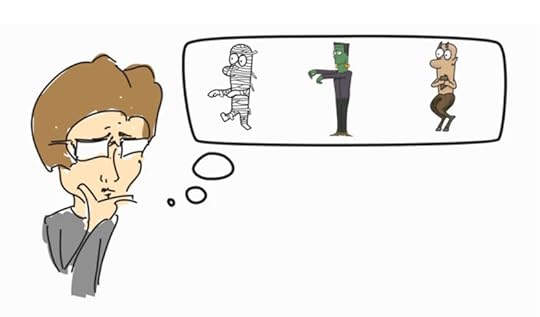
If you make a controversial statement, stand by it.
For example, don’t get all preachy on social media about being #plasticfree then package your products in single use plastics. Your behaviour and the values behind your business should be aligned.
There have been high profile campaigns in the press where big brands have claimed to have one standard then have advertised in places that represent an opposite view.
Own It
If you said it, and you believe it, stand by it. Take responsibility for it. It’s your business after all, the buck stops with you!
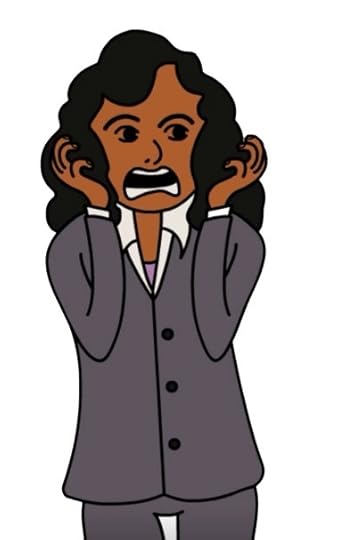
No one trusts a back-peddler.
Many a famous figures has fallen from grace or had their careers destroyed by publicly and inexplicably changing their stance on an issue, saying one thing and doing the opposite or cultivating a public profile and behaving in a away contrary to that.
Changing your mind is fine, as is apologising for your mistakes. But don’t weasel out of it, or blame someone else. Back it up, otherwise you can look like a fraud or a liar.
It’s Okay To Disagree
It’s okay to criticise someone’s argument or position. It’s okay to have a different opinion.
It’s not okay to personally attack someone or use irrelevant ‘evidence’ to back up your version of the story.
As long as you stick to those principles, you can confidently own your statements.
Yes, there will always be people that will take it as a personal slight, but that’s their choice, not yours.
There will always be haters. There will always be trolls. But if you can spot them, so can everyone else. Our interconnected world makes it easier than ever to attack and disappear into obscurity.
Engage those that disagree respectfully in an appropriate debate, so far as you feel able. Criticism is healthy for us. It’s how we learn, articulate ourselves and fortify our positions.
Don’t engage with the haters. Ignore, block, report if necessary. But know the difference.
Be In The Debate
Healthy debate respects other people’s right to have a different opinion to you.
Debate allows you to back up your argument with factual information, but be clear when it is just your opinion. Healthy debate is done so in a positive and assertive way, but you must also to fact check your information. Many ‘facts’ are really just opinions.

If it’s a cause you are passionate about, a cause that defines the business you run, embrace it. Become an authority on the subject. Be an ambassador for a particular point of view. Become a leading figure in the debate and your business will thank you for it.
“Being controversial can be brand defining” (Tweet This)
Facts Vs Opinions
In the age of 24-hour news we are bombarded with speculation and assumption presented as ‘news’. It’s often just politically motivated opinion presented as facts. Take everything with a pinch of salt and check your sources before you foist your opinion on someone.
Admit it, we all do it from time to time!
World-changing decisions have been made based on an opinion being repeated so many times it’s accepted as fact.
The credibility of your business is at stake here.
“If you choose to make a stand, make sure you don’t do so on shaky ground!” (Tweet This)

Quick Step Test
Here are my quick references to test your own boundaries:
Attack the argument, not the person
Be clear when you are voicing an opinion
The fewer boundaries you have, the deeper connection you will make with the people that want to be part of your world
If something stirs a string emotional reaction in you (usually anger in this context), take a moment to critically analyse the source. Is it written in deliberately emotive language? Are you being manipulated? (The tabloid press are experts at this approach, because fear and anger sells papers!).
If you have to ask, “Should I Write that?” – Take a breath, step away for a while then come back to it. Double check your facts, ask for a second opinion and make your decision from a logical, rather than emotional standpoint. If it still feels wrong, don’t do it!
What are your instincts telling you? Listen to them, then look at the facts dispassionately before you present them.
Move Forward With Positivity
When I offer feedback to the businesses I work with on their blogs (Feedback Sessions), by far and away the best ones, and those I enjoy reading the most, are the blogs that tell a story. The ones that show vulnerability and struggle. The ones that unapologetically voice a clear and strong opinion.
Everyone loves a little controversy, it makes for a great story!
Anyone can write safe, jargon-cluttered, pastiche blogs – which is why no one cares about those.
I hereby give you permission to be controversial, but to do so sensitively and respectfully.
Great writing divides opinion, just as great businesses do.
How controversial are your blogs?
If you would appreciate a 2nd opinion; a professional writer to give you constructive criticism on your blogs, talk to me about Feedback Sessions.
Book in a free 30 minute Clarity Session for some quick tips and advice to move forward with your business blog.
The post How Controversial Should My Blogs Be? appeared first on Amy Morse.
April 30, 2018
What’s the Difference Between a Niche and a USP?
If you’ve ever been on any enterprise training there are two things you’ve probably been asked….

What is your USP?
and
What niche are you in?
So, what’s the difference and why should you care?
USP
USP = ‘Unquie Selling Point’ – or ‘Unique Sales Proposition’- (if Y’all is in your vocabulary)!
My personal opinion on this acronym – aside from the fact that, as a rule, I despise acronyms (because acronyms just make people who don’t speak in your industry code feel inferior!) – is that “USP” as a concept is meanignless and outdated.
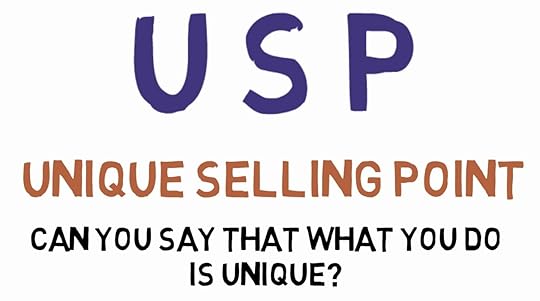
Let’s face it, there are plenty of Business Coaches, Personal Trainers, Marketing Consultants, Life Coaches, Solicitors, Mortgage Advisors… blah, blah… whatever it is you do in your business, you’re not the only one doing it.
What this acronym really asks is, “How are you different from every other whatever-you-do?”
You could say something a bit cliche and trite like, “our customer service is exceptional”, “our people are lovely”, “our products are quality, yet affordable”, “we really care about our business”… so what?
Anyone who can’t honestly say those things about their business, frankly, shouldn’t be in business!
The only thing you can truly, 100%, say is unique about your business is YOU. And what makes you, YOU is your story!
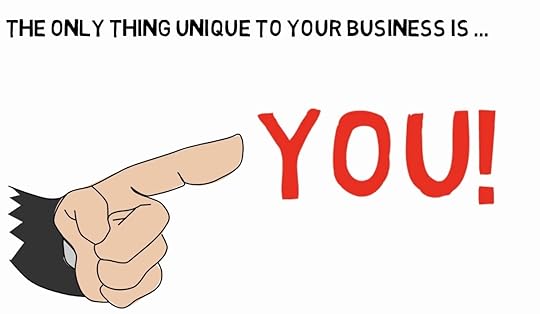
Your ‘USP’ (if we insist on still using that phrase) is something ‘internal’ to your business that differentiates it from others.
Niche
Ask yourself, who is really your customer?
Please DON’T say ‘everyone’ – it’s just not true!
Sure, a wide range of people could benefit from what you do, but that is never ‘everyone’!
Everyone is NEVER your customer!
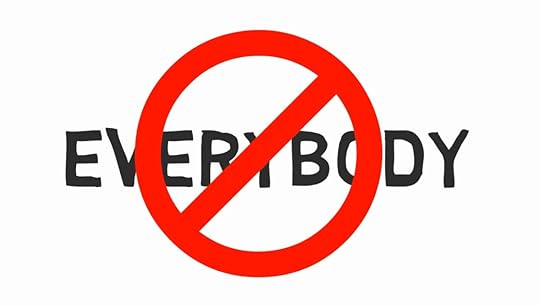
They just aren’t.
Live with it.
If you try to be all things to all people you end up being nothing for anyone
In my recent ‘Know Your Blog Niche’ webinar (watch the summary video below) I worked though the example of my business as a fiction author, writing as Amy C Fitzjohn.
I could say, “everyone can read my books” but it would be a lie.
Yes, they are available on one of – if not THE – world’s biggest online retailer, Amazon – so potentially anyone in the world could buy an eBook.
However, in reality, not everyone buys books online.
Also, my books are in English, so anyone who doesn’t speak that language is not my customer.
Many people just don’t read for pleasure, so would never buy my books (expect maybe as a gift).
Plenty of readers aren’t interested in mystery adventure fiction.
Already, with just a few common sense criteria, it becomes obvious that everyone is NOT my customer.
The same will be true of your business.
Like it or not, you won’t be for everyone – and that’s fine.
It’s more than fine. It’s great, in fact! Because once you realise that, you can breathe a sigh of relief and concentrate your energy and efforts on the community of people that WILL be your customer, and they will love you for it. You’ll attract more of the same and your advocates will bring their associates along too.
That community. Those advocates. The people who will rave about your business. They are your ‘niche’.
They are the segment of the overall marketplace that you need to focus on – ignore the rest, go on, I dare you.
Others will still pay attention to you, outside of that particular slice of the pie, and that’s OK, but don’t be distracted by them.

Therefore, a ‘niche’ is ‘external’ to your business. It’s the particular slice of the pie your business will bite into first.
Make sure it’s a pie you enjoy!
Niche vs USP
Watch the summary video of my ‘Know Your Blog Niche’ webinar for a quick exercise to start to work out who your niche really is.
Who will be reading your words and what do they want to hear from you?
For instant updates when I publish a new blog post, Follow me on Bloglovin’
For extra goodies and exclusive new information, join my mailing list HERE. (I only send a newsletter monthly so I won’t spam you, I promise!)
The post What’s the Difference Between a Niche and a USP? appeared first on Amy Morse.
April 20, 2018
The Story of One Entrepreneur Learning to Love Her Words
I meet some wonderfully inspiring entrepreneurs in my line of work, I’d like to share the story of one such woman in business.
Lisa Beasley is just the kind of entrepreneur I love working with.
Her business, My Body Positive, is built around her deeply rooted need to help others, to change the world for the better.
How I’ve Helped: ‘My Body Positive’, A Case Study Story

Lisa Beasley- Founder of My Body Positive-on a mission to help women stop dieting and discover Mindful Eating. Image Credit: Jenny Stewart Photographs Real Life*
Lisa defines her business around a powerful story.
A story of personal vulnerability, overcoming adversity and supporting others to change their mindset about food and body image.
Strong values and a passionate philosophy underpin all the work she does.
As the leader at the heart of her business, Lisa has a simple yet powerful message, and that’s ripe fodder for a great blog!
Mentoring Leaders to Tell Their Story
I first met Lisa at a networking event around a year ago. I was struck by her honesty and authenticity. Our digital paths also crossed as we have many shared connections in the Bristol business community. For one of the UK’s big 5 cities, Bristol is a small place!
After meeting in person then connecting online, the first step on our journey together was a 1 to 1 meeting to unpack Lisa’s challenges around blogging. A ‘Clarity Session’.
Lisa had a strong instinct that she had something to say, a story to tell and realised blogging would be a great forum in which to tell it. With an already active Social Media presence, it was a natural evolution to use the profile she’d started to build to bring people into her world, to take them out of the Social Media space and onto her own website, and then to give them a reason to settle in and stay a while.
By bringing people away from Social Media and onto your website, you can control the conversation. Your website is not at the mercy of someone else’s algorithm.
Having a blog on your website attracts 97% more traffic. But, it’s also the best way to share your story, chapter by chapter. Bring people along on your journey and allow them to get to know you – the real you – then the right people will start to get to like and then to trust you.
I took Lisa out for a coffee and a catch up recently to find out more about why she’d come to me, how my mentoring had helped and what she planned to do next with her business…
The Next Chapter in Lisa’s Story?
“What was it that drew you to my services?” I asked.
“It was obvious, really. I wanted to get to grips with blogging. I had no idea where to start. When I met you at networking, you were the logical choice.”
Getting started with your writing is often the hardest part. When Lisa and I met for our first 1 to 1, we met in person, rather than on Skype, as she lives across the city from me.
Lisa didn’t know where to start, she had so many questions she was frozen in overwhelm. With an underlying lack of confidence, stemming from the fear of ‘getting it wrong’.
Getting Started
We started with a ‘Skills Session’.
We unpacked Lisa’s challenges and hang-ups, dealt with immediate questions, such as…
How often to blog?
How much to write?
How to get others to see you content?
(Just some of my Frequently Asked Questions about blogging)
The next stage was to set a simple plan to move forwards.
Moving Forwards
A plan doesn’t have to be a massive document with appendices and stodgy blocks of jargon. I favour something simple, perhaps even visual, much like my Creating a Content Calendar free workshop.
When I work 1 to 1 with a new client I give them a copy of my ‘Blogging for Business’ book.
Lisa’s ‘homework’ after our first session was to read through it, cover to cover (it’s quite short and should only take an hour or so.)
“The blog sharing checklist (in the book) is really helpful. I can be scatty sometimes so it’s useful to have a systematic approach and bit of structure to keep me focussed.”
Lisa was not short of ideas, and already had some half-written blogs.
We set 3 intentions at the end of the session, one of which was to have regular ‘Feedback Sessions’.
Getting Regular Feedback
Lisa started to send me regular draft blogs, some partly written she’d got stuck with, others more fully formed she wanted critique on.
I use the ‘Track Changes’ function on MS Word and plenty of comments on each piece of writing. I return the feedback over email within 72 hours (usually sooner than this).
The feedback sessions are feedback on 2,000 words and a catch-up call. 2,000 words is enough for 2-3 blogs and the calls keep my clients accountable, giving them an opportunity to ask questions, pick my brains, and discuss their challenges along the way.
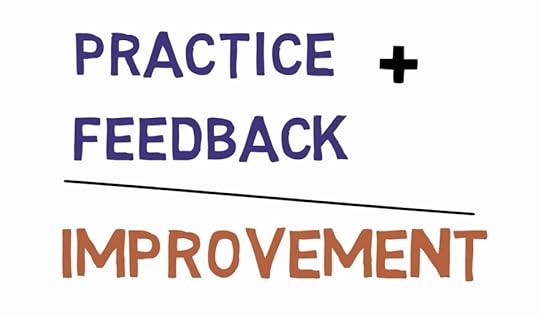
“I really appreciated the feedback. I felt encouraged and supported and soon started to notice the small mistakes and repetitions I hadn’t realised I’d been making.”
Other people’s writing is rarely as bad as they think it is. We’re all our own biggest critics!
“We’re all our own biggest critics!”
Getting feedback, in a positive and encouraging way, with practical suggestions to improve their writing, quickly helps my clients to believe in their own ability to write.
When we realise we can do something, we soon find we can enjoy it.
Over the next few months, Lisa would regularly send me blogs for feedback. She also found the courage to start posting blogs regularly.
Loving the Process and Growing in Confidence
We would catch up once a month for a 1 to 1. Because we are both in Bristol we’d meet in person in one of Bristol’s lovely coffee shops (always a great excuse to soak up some café culture!), but we could just as easily have met over Skype or Zoom.
Lisa would bring blogs she’d been working on to the meetings.
Some of our sessions were Q&A’s.
As Lisa’s confidence grew she was keen to soak up new skills and do more with her blogs.
We worked on adding links and other tweaks for SEO (Search Engine Optimisation, ‘being Google friendly’) and giving readers something to do next by making decisions about ‘calls to action’ on her blog, so readers were driven into the services she wanted to promote that month.
“I found the systems really simple and efficient. The invoices were always timely, professional and easy to pay.”
Blogging Success
“How has this impacted your success?”
“It’s hard to say specifically, but finding my voice and my confidence with my blog has filtered across into all other areas of my business. It’s been invaluable.”
Reuse, Recycle Repurpose
After I’d recommended repurposing her blogs into other parts of her business, Lisa has used it for her last newsletter by repurposing a Facebook post.
“It saved a lot of time. And took the pressure off coming up with an idea on demand. I now have plenty of blogs to choose from to inspire other marketing ideas.”
There are always unsubscribes when you send a newsletter, and Lisa used to worry about these. Now she realises she’s found her voice through her writing and is less afraid to be a bit controversial. She’s reaching the people it’s supposed to reach, refining her list to those who really want to read more.
“It’s introducing people to my message in a different way. I’m much more confident sharing my vulnerability with people. It’s still scary, but it’s also very cathartic!”
“Are you likely to recommend my mentoring to someone else?”
“I already have! At least 2 other people, in fact. It really helped me and can really help others, too. And that’s all I want to do. Just to help.”
Has It Been Worthwhile?
“Has it been a worthwhile process?”
“It’s been hugely worthwhile. Having the freedom to speak to others, to spread my message and overcome some of my fear about writing. I’ve never considered myself a creative person, but this process has taught me I’m much more creative than I ever thought I was. It’s empowering.”
We’ve not had a feedback session recently, but I’ve seen the great blogs Lisa has been sharing. I’m always happy to share the work of the clients I’ve supported.
Lisa has also been published on other websites and had some local publicity. She’s been interviewed on BBC Radio because of the story she’s telling.
“Did anything change that you weren’t expecting?”
“The one thing I didn’t expect was how much I enjoy it! Blogging is such a cathartic process. I’m learning so much.”
Future Challenges
“What are the biggest challenges on the horizon for your business?”
“At the moment, my biggest challenge is working out where it’s going. There are so many possibilities. What’s next? A book? An online course? I’m not sure yet.”
Lisa has some book ideas and likes the idea of having a book.
She’s gone from hardly writing at all to the ambitious writing idea of taking on a book.
Because Lisa has developed healthy writing habits during the time we’ve worked together, a book is a realistic target now, plus she already has some fantastic blog content she could add value to for a book. She’d like something tangible she can give to people, raising her profile as an expert in mindful eating and growing her influence, so she can reach out to more people.
Her mission is to help more people to turn their back on diet mentality and feel good in the skin they’re in.
By blogging, Lisa can take that mission to the world.
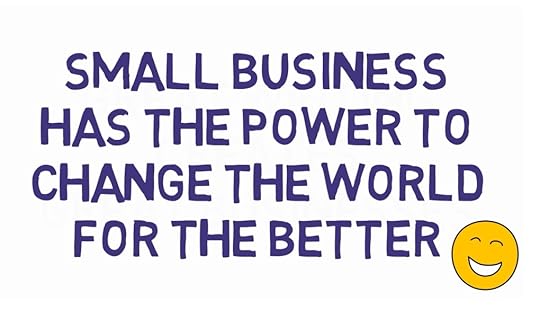
*This beautiful picture of Lisa is coutesy of the lovely ‘Jenny Stewart, Photographs Real Life’
See Jenny’s work here: https://www.jennystewart.co.uk/
For instant updates when I publish a new blog post, Follow me on Bloglovin’
For extra goodies and exclusive new information, join my mailing list HERE.
I only send a newsletter monthly so I won’t spam you, I promise!
The post The Story of One Entrepreneur Learning to Love Her Words appeared first on Amy Morse.
April 16, 2018
Six Blogging FAQ
As a blogging mentor for businesses, I’m frequently asked to speak at events on the finer points and skills associated with building a successful business blog to grow your influence.
When I’m speaking to new bloggers, I’m always asked the same questions (FAQ), and the six most frequently asked are:
Six Blogging FAQ’s
How often should I blog?
What’s the ideal length for a blog?
What shall I blog about?
How do you make the time to blog?
What are the benefits of blogging?
How do I get people to see my blogs?
I’ve written more comprehensively on each of these topics, but here’s my whistle-stop overview of those FAQs:
FAQ 1: How Often Should I Blog?
Ideally, at least once a week. However, going from never having written a blog to churning out one weekly is a tall order!
I would NEVER advise a new blogger to aim for weekly blogging.
If you set your initial goals too high, you’ll never attain them, then you’ll lose motivation and feel like you’ve failed.
It’s far better to build up to doing something more regularly, get used to it, make it part of your routine and find your voice.
Therefore, I recommend aiming for monthly, initially.
We can all find a couple of hours every month. From a Google point of view, updating your website monthly is enough to keep it alive for search engines.
If you leave it much more than a couple of months between blogs, when someone clicks through to your website they’ll ask, “is this business still trading?”
“The moment you put doubt in people’s minds, the moment you lose their attention.”
Give yourself a pat on the back when you achieve your monthly goal.
But the funny thing with creativity, the more you do it, the more you want to do it.
Once you start writing regularly you’ll naturally come up with new ideas.
You’ll start with monthly blogging, then do it more frequently without really realising it. With a little feedback and accountability from a mentor to keep you on track, before you know it you’ll be weekly blogging!
FAQ 2: The Ideal Length for a Blog Post
Too short and you can’t add any value to a topic.
Too long and you run the risk of waffling or losing people’s attention.
There are, of course, exceptions this. Seth Godin made a success of blogging under 300 words, daily.
The best writing also says a lot with few words.
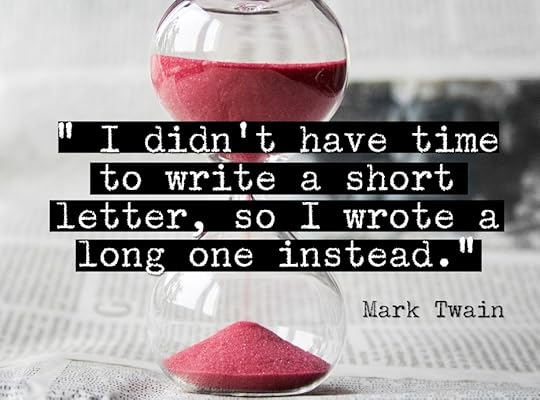
There is mounting evidence that long form (2,000+) blogs are great for SEO (Search Engine Optimisation – in other words, being found on Google) and many readers want something more substantial to read (depending on who your customers are).
Knowing your customers will help you answer this question for yourself.
A Mixture is Best
You can test your audience by sharing a mix of long and short content.
In fact, a mix of long and short content is great for the health of your blog, your website and your own creativity.
If I had to put a figure on it, I always recommend between 500 and 1500 words.
Around the 800 mark seems to be the standard length of most blogs.
Don’t Worry About The Length Until You’ve Finished Writing
Don’t start writing your blog obsessing over its length.
The first step is just to get the ideas out of your head.
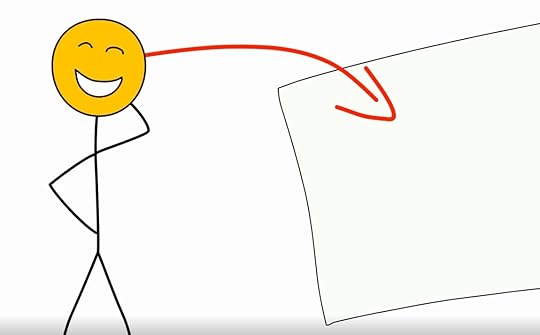
Brain Dump it first, without self-editing and without worrying about the amount you write.
The real writing happens in the edit.
Until the words are out of your head they are useless to anyone, once they are on the page you can do something with them.
Get the words out, then step away from your shoddy first draft for a while and return later with a fresh pair of eyes before you start editing.
You often find a blog will start in one place then go in another direction as you write it.
Perhaps there is more than one blog in there?
Nothing you write is ever wasted.
Store your unused writing in drafts somewhere and you can always use it for a future blog.
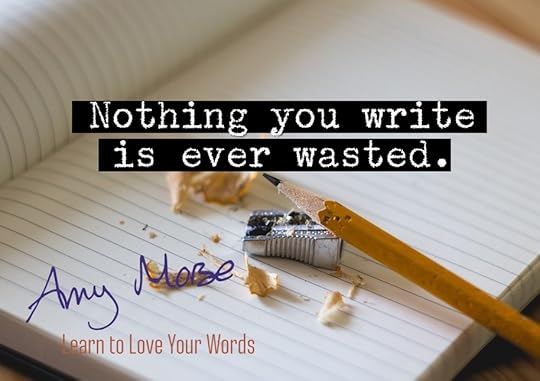
FAQ 3: What Shall I Blog About?
Write about what you love!
The best blogs are written with passion.
They share a story.
It’s not about ‘what you do’ it’s about ‘why you do it’. Don’t blog about the thing you sell, blog about its benefits.
Consider why your clients use your product or service. Consider what your best clients have in common and find a theme for your blogs that fits with this.
Don’t be afraid to show a little vulnerability.
Allow people to get a glimpse of who you are and what you would be like to work with.
Much of the work I do with clients is helping them to ‘unlearn’ academic writing and embrace the power of writing more creatively and honestly.
Stop hiding behind jargon and buzzwords, start telling a story!
FAQ 4: How Do You Make Time to Blog?
We all have 24 hours in a day.
“I don’t have time” is the excuse we use for everything that isn’t a priority.
The simple answer to this question is make the time then show up and do it.
I do, however, appreciate this is sometimes easier said than done.
We all have busy lives.
If you are only blogging once a month that isn’t much time to find. Allocate it in your diary then show up with a positive attitude and get on with it.
When you run a business, this is your job. Whether you want to do it or not, you need to show up, just as you would when you work for someone else.
Don’t let yourself off the hook so easily!
If you need to be held accountable for the time you make for blogging, speak to me about ‘Feedback Sessions‘.
As with all the other marketing activities in your business, the best time to write is little and often.
Allocate space in your diary every week, even if it’s just half an hour here and there.
When you are in peak of creativity, bank lots of rough blog content.
When you are in a creative trough, do ‘writing related activity’.
Writing Related Activities:
Planning your blogs
Doing research
Editing existing blogs
Reading other blogs to get some inspiration
Thinking time
Thinking time: Yes, I hereby give you permission to just sit and think!
The important thing is to just get on with blogging.
If you show up telling yourself you hate writing and you have no ideas, then you’ll rarely disappoint yourself.
If you show up with a positive attitude, telling yourself you’ll enjoy spending time with your ideas, just being creative or getting all the stuff swirling around in your head out onto the page, you’ll soon learn to love your blogging time.
When you love something, you’ll always find the time to do it!
FAQ 5: What Are the Benefits of Blogging?
I could write so much on this (and have).
There’s plenty on this in my ‘Blogging for Business’ book.
I’ve also blogged about it in the past, so I’ll just give you my top 10:
10 Benefits of Blogging for Your Business
Bring traffic to your website – 97% more!
Raise your profile as an expert and influencer – your ‘personal brand’!
Improve your writing skills
Refine your business, through research and testing
Tell your story – Let potential customers get to know, like and trust you
You’ll always have something to share on Social Media!
Creating a body of information that has value in your business – make money!
Aligning your marketing activity with the goals of your business – driving your Content Marketing!
Finding your voice and expertly articulating and communicating what you do and why you do it
Most importantly… Because it’s fun! Blogging is a cathartic process. It’s lovely to be able to express yourself and share your story.
FAQ 6: How Do I Get People to See My Blog?
Firstly, you can’t ‘get’ anyone to do anything!
The best you can do is to make them aware of it, then make it an irresistible read for them.
It won’t be irresistible to everyone.
To be irresistible to just one person, you need to know who they are.
You need to know who your best customers are and what makes them tick.
You need a niche for your blog.
(Join the ‘Know Your Blog Niche’ free webinar HERE)
There is plenty you can do to attract readers to your blog. Here are a few ideas:
Share the link on Twitter with an enticing Tweet and appropriate hashtags
Share on your Facebook page. Pay for a boost if appropriate
Share in Facebook groups where you are active on approriate days
Add you URL to your email signature
Pin the blog on Pinterest
Share an image for the blog on Instagram and direct people to the blog content
Share on Linked In
Add the link to your newsletter
Download my ‘Bog Sharing Checklist’ for more ideas: Blog Sharing Checklist Apr18 V1.1
These are just the most popular FAQs I get asked about blogging.
Do you have other questions I’ve not covered?
My free ‘Clarity Sessions’ allow you to ask those questions (and there’s no such thing as a silly question!)
You can join my mailing list HERE and get a monthly update straight to your inbox
You can join one of my free Blogging Skills webinars HERE
The post Six Blogging FAQ appeared first on Amy Morse.
April 4, 2018
Why It’s Important To Write Original Content
I get several pitches a week from people wanting to write for my blog, and I’m always happy to consider original posts.
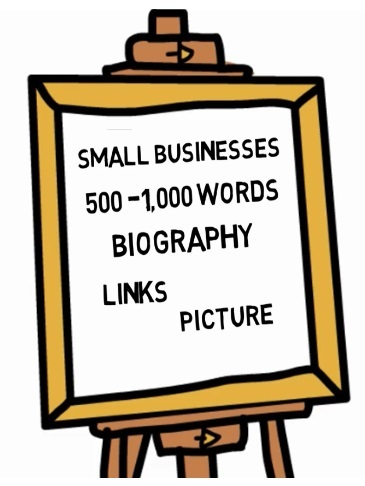
But when Richard Smith contributed this article I resonated with it immediately.
I run workshops for a couple of Enterprise Agencies (listed on my Events Page).
An icebreaker question I use, is an exercise to find out something interesting about the person you are partnered with.
It’s always a tough one for people.
I hear delegates saying,
“But I’m boring…” or,
“But I’ve never done anything interesting…”
The truth is, we all have a story to tell.
They say there is no such thing as original idea anymore, but we all have a different take on a story.
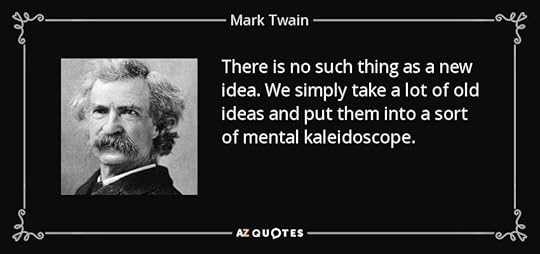
We dismiss ourselves as uninteresting because we know ourselves and the lives we’ve lead.
Our own experience always seems so ordinary or mediocre compared to other people.
Just a cursory look at Facebook could make you believe that everyone else is having more fun and is more interesting than you!
And here’s the rub… most of us are thinking this!
“We dismiss ourselves as uninteresting because we know ourselves and the lives we’ve lead.”
So, no matter how boring you believe your life is, to someone who hasn’t lived it, it’s fascinating.
When it comes to our blogs, it’s easy to fall into the trap of believing we have nothing of value to say. So, we rehash ideas or reshare and roundup other people’s original content.
While this can have some value, and still be useful to your readers (provided you’re not plagiarising!) there is really no substitute for creating your own original content. Share your own ideas. Add value to the conversation not only by regurgitating other content, but being proud to tell your story your way.
Why It’s Important to Write Original Content

Most of the time when we want to create new content for an article, blog post, or a book, we usually go onto the internet to find out how it is being done. This, usually, is to review what is out there on what we want to write about, and how it is presented.
This process, in most cases, as you would be able to observe from most content on the internet leads to the creation of information, rehashed, revised and repackaged, without any meat or quality added to the content.
There are lots of quotes and memes doing the rounds which surround the creation of duplicated content. It is without doubt that you would have seen some of these:
When you pick from one source, it is plagiarism. When you pick from many, it is research (attributed to several authors)
Immature poets imitate; mature poets steal (T.S. Elliot)
Originality is undetected plagiarism (William Ralph Inge)
And my personal favorite:
Whaddya mean all my facts are wrong? I copied everything straight off the internet! (Stephanie DeMichele’s blog)
So maybe you see the humor in duplicated content or you understand the gravity within, the truth is that original content is required to create lasting relevance in a content-driven world.
Original content stands out and resonates with your audience
There simply is no duplicate to when writers and authors communicate with their audience using their voice. Whether as an individual, an agency, company, it is very easy for readers and customers to detect when a brand is culling out content from the core, or when it’s simply been repurposed to fill up blog space.
The purpose of your writing is to communicate information that would be of value to your audience. Even if at the onset you may get some information wrong – although that’s not recommended, your audience wants to know that you made an effort to connect with them and that you care about them – and not just your bottom line.
New ideas come looking for you
Popular sitcom producer, Chuck Lorre is famous for smash hits like Two and a Half Men, The Big Bang Theory, and recently introduced spin-off, Young Sheldon. It is interesting how he says he came upon the idea for currently in its eleventh season and ongoing to twelve, The Big Bang Theory.
It was during a conversation with co-producer and writer, Bill Prady, who shared a story about how as a computer programmer in the 80s, among friends, they found it difficult to engage in the normal social life and regular activities that teens did.
And then they thought, “Why don’t we come with something from this?”
A TED talk given by renowned writer of Eat, Pray, Love, Elizabeth Gilbert emphasizes this point. She explains how writers are usually at the mercy of the creativity that comes to them at inopportune moments. She refers to this as creativity seeking self-expression and wanting to come into existence.
Creating new content opens your mind to be receptive to new ideas. These new ideas also make you communicate better with your audience. And so, not only would you benefit, but your audience also.
Your Original Content is tied to Your Brand
Professional ring announcer, Michael Buffer’s Let’s get ready to rumble has gone on to be probably the most iconic words in sports history. Michael Buffer explains how early in his career, he sought for ways to make the ring announcing more interesting and memorable. From rehearsing consistently to get the judges’ names right, to trying new catchphrases to get the crowd excited, he finally chose ‘Let’s get ready to rumble’.
Those simple words represent the Buffer enterprise brand. Trademarked, they have earned Buffer contracts in boxing, wrestling, other sports, movies, video games production, and toys production. They have also earned him an estimated 400 million dollars!
Similarly, your content is your brand, i.e. something that customers identify with. Through these, readers and customers identify the role your words play in providing them what they want, and how they can get it.
Avoiding the Plagiarism Tag
You must have heard of high-profile cases of plagiarism. The earliest I can remember was that of Joe Biden, who had to drop his presidential aspirations because there were suspect areas of plagiarism in his speeches. There are several other cases of members of governing bodies, who had their school degrees rescinded, and had to resign from their positions, because of the plagiarism indictment.
In the present day, the instances of plagiarism are easy to detect. With plagiarism software and websites like https://writingpeak.co.uk/plagiarism-checker, you can identify plagiarism within minutes.
So, presently, while it may not seem grave, years later, you could be battling the issue of plagiarism over a lengthy period, and more so, if your content spreads.
You could have a book in the making
If your content or content niche is in high demand, there is no saying that you cannot revisit the most important points, add up to date and more quality information, and repackage into a book – the objective being to give more value to the reader.
This is simple: Rather than readers having to scour through your blog looking for information that corresponds to their immediate need or requirement, they would have a systematically arranged script that points out the relevant information, in a well-arranged manner.
Now you do know that while you may able to get away with information in an article or on a blog post, a book puts you in the limelight, and opens you to a larger audience who would vet your content.
In conclusion, creating original content makes you stand out from among the junk and trash that is available. This is not to say you cannot give credit or act upon some other person’s ideas. The perks to creating original content, however, is similar to how past writers and authors – living or dead have been quoted and revered for their work, you might start a process that far exceeds that corner of the internet you call your own.
For instant updates when I publish a new blog post, Follow me on Bloglovin’
For extra goodies and exclusive new information, join my mailing list HERE.
I only send a newsletter monthly so I won’t spam you, I promise!
The post Why It’s Important To Write Original Content appeared first on Amy Morse.
April 3, 2018
If I’m On Social Media, Do I Really Need a Website?
I recently gave a talk to The Society of Authors in Bristol on ‘Blogging for writers’. I recommended hosting a blog on your website, busted five myths about blogging and had a Q&A session.
One of the participants asked me, “Do I need a website if I blog on social media?”
This is an interesting question, and one that comes up frequently, after all, Social Media is just a form of microblogging, right? Whether it’s 240 words in Twitter, a daily Facebook post or an Article on Linked In.
In short, my answer to their question was ‘yes’.
If you are serious about building a personal brand, a business – and in the case of the writers in that room, selling more books – you do need a website.
Even if it’s just a simple one.
But, why….?
There are plenty of reasons, but I’ll start with just one word:
Algorithms.
Noun – a process or set of rules to be followed in calculations or other problem-solving operations, especially by a computer.
This word – usually the preserve of geeks – crops up more and more in mainstream media. Largely in association with Social Media channels, such as Facebook.
Facebook has hit the headlines several times already in 2018.
Firstly, their announcement in February that they had changed their algorithm, so users see more of what they like.
The cynical among us would suggest that this was a move to ‘encourage’ businesses to spend more money on advertising with them?!
Secondly, privacy. The user data scandal involving political-advertising firm Cambridge Analytica, who obtained data on as many 50 million US user’s accounts.
Over the coming days after the news broke, the hashtag #DeleteFacebook set Twitter ablaze.
Trust in the Facebook brand has hit an all time low.
Thirdly. Audience demographics.
A networking colleague remarked recently that their 15-year-old son had scoffed, “Facebook is for old people.”
OK, so when you’re 15, anyone over the age of 25 is considered ‘old’, but it does highlight the fickle nature of different social networks.
Do you remember ‘Myspace’, or ‘FriendsReunited?’ (If you’re 15, definitely not!)
I don’t mean to be overly critical of Facebook – it’s just an example – I use it to stay in touch with friends and family. When living overseas it allowed me to feel connected to my loved ones back home. Plus, the only way to organise my family is through Facebook messenger!
The point is, you have no control over Social Media.
If you rely on it as your only space on the web, you’re only doing half the job.
Social Media doesn’t ‘sell stuff’ but your website does.

How do you convert views, likes and follows into business and tangible connections?
…You need to send them to a website!
There are two main reasons to be on Social Media for your business:
Conversations
Driving traffic to your website
Yes, Social Media raises awareness, informs, entertains, builds your profile, etc. etc. But, unless you get people away from the Social Network and into your own world, you lose control of your buyer’s journey.
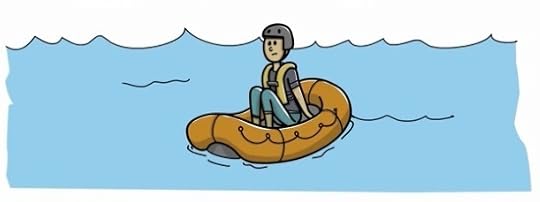
Don’t get cast adrift by Social Media
There is also the grey area of who owns what data.
At least if you’ve written it yourself on your own website you hold all the rights to it. This means you can reuse it and repurpose it into other things as you see fit.
All that being said, I’ve been an enterprise trainer for the many years and still do some freelance training for different agencies (find them on my Events page). One of the most expensive, yet surprisingly common, mistakes start-ups make is to invest in an all singing, all dancing website from day 1. At this stage they don’t really know what they are doing, who they are doing it for and how they will do it. It’s easy to get carried away.
Your Website Will Change Over Time
I’ve just launched the third iteration of my website since starting my business almost 3 years ago. Although my current website is fit for purpose as my business stands today, I have no doubt it will chnage in years to come.
Personally, although I’m happy to maintain my WordPress blog, the thought of attempting to build my website myself is terrifying!
I’ve always had a web designer to build my websites, I then maintain and update the content.
When is a Good Time to Have a Website?
Ideally, you would want to have a simple website from day 1 of your business. However, don’t let that stop you. Build a presence on Social Media first, you can start to generate some buzz about your new business.
Get conversations going and use Social Media to understand who your audience is and what they want.
You’ll find the confidence to tell the story of your business in your own words, because the more you talk about it, the clearer it becomes in your own mind.
Once you’ve started to establish a name for yourself, even to a small audience, that’s a good time to consider building a website for yourself. Or, investing in some help with this.
Website Vs Social Media

Social Media brings people to your website. Your blog gives people a reason to stay. Your website brings customers into your business.
Share your story on Social Media, have those conversations, build relationships. But remember, Social Media is only one tool in your marketing toolbox.
The moment you relinquish control of your digital marketing activities to Social Media, the moment you lose control of your business.
The post If I’m On Social Media, Do I Really Need a Website? appeared first on Amy Morse.
March 26, 2018
What’s the Difference Between a Coach and a Mentor?
I posed a question to myself at the start of the year, “Am I really a coach, or more like a mentor?”
When I work with start ups for Brave Enterprise Agency, I’m described as a mentor. Someone who’s been there and is passing on their knowledge to those further behind on the enterprise journey.
Describing ourselves and what we do, when asked that inevitable question, “So what do you do?” can be a challenge when you are your business.
I’ve had job titles in my corporate life describing me as a ‘coach’.
I’ve been a Work Coach and an Enterprise Coach.
When my world’s as an author and business advisor collided and spawned my own business in 2015, I gravitated towards describing myself as a ‘Writing Coach’.
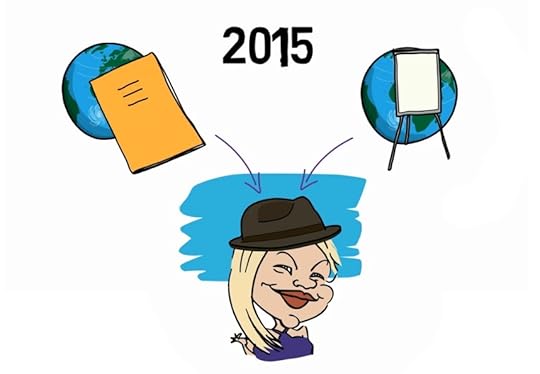
The problems is, that wasn’t specific enough.
Calling myself a ‘writer’ got me the wrong work – copywriting jobs.
And calling myself a Writng Coach somehow wasn’t right.
In business, you need to make what you do really clear and simple, otherwise, you won’t attract the right people or the right kind of work.
It’s hard for anyone to refer to you when they ‘don’t get’ what you do.
How we describe what we do is as fluid as our businesses.
Naturally, we’ll change, progress, do it differently, as we adapt our approach to suit the changing demands of the market and of our customers.
One of my Brave mentees said to me last week, “But I feel like I’m just making it up as I go along!” At which point, I reassured her, “We’re all just making it up as we go along. The imporatnt thing is to enjoy the ride!”
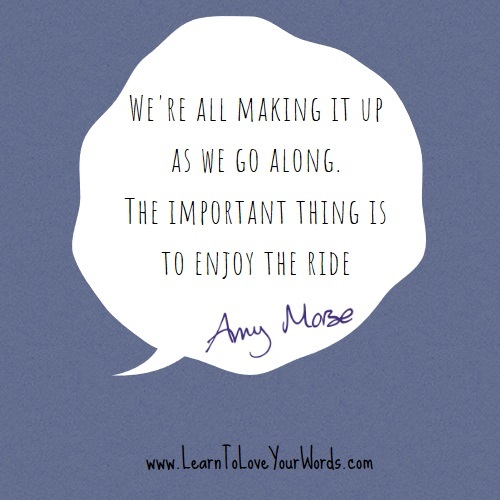
Am I Mentor or a Coach?
I realised something recently; the work I do – supporting entrepreneurs writing their blog, or book – is more mentoring than coaching. I’ve taken to calling myself a Blogging Mentor, more and more. It seems appropriate as I build up my profile as #AmyQueenOfBlogs. Even though I also mentor people to write their book, my process begins with developing healthy, regular writing habits through blogging, first.
Why the change? What difference does it make?
When you really refine the work you do, you can build a stronger, more authentic profile.
It’s better to be known as the ‘go to person for X’ than being wishy-washy.
I want to be the go to expert for business blogging.
When you’re confident and clear about what you do, who you do it for and why you do it, it’s much easier for others to have confidence in you and be clear on how you can help them.
It may just be a word, but sometimes changing one small word can change the impact of the whole sentence. Do that enough times and you’ll write a whole new story.
Ditch the wishy-washy and become memorable.
What’s The Difference Between A Coach and mentor?
I asked the Googlebot and it spat out this handy article from Forbes: Read More.
It’s not entriely appropriate as it applies to career progression within a business, however, in essence:
A Coach Is…
Someone trained and certified in a coaching practice or tool and has strong process management skills. For example, they may be qualified in NLP (Neuro Linguistic Programming).
A coach works for a fixed time on a defined project or goal.
When I work with my clients, it’s not necessary for me to understand their industry. The tools I’m sharing can be adapted to all sorts of businesses.
Accoring to Wikipedia: “Coaching is a form of development in which a person called a coach supports a learner or client in achieving a specific personal or professional goal by providing training and guidance.”
A Mentor Is…
Someone who has been there, done that as is passing on their wisdom. A relationship is long term, or ongoing.
I’m a writer. An author. A blogger. I established my author profile by blogging. Over time, I developed expertise in bloth blogging and book writing.
I’ve worked with clients on a one off basis, or been there for them over the course of a few years. I have clients I’m working with now, who I worked with in my old life as a Coach at an Enterprise Agncy. We’re on the business growth journey together.
I think of a mentor as someone who helps you along your journey. Someone who’s walked a similar path themselves, but we’re both learning along the way.
Accoridng to Wikipedia “Mentorship is a relationship in which a more experienced or more knowledgeable person helps to guide a less experienced or less knowledgeable person. The mentor may be older or younger than the person being mentored, but he or she must have a certain area of expertise.” …in my case, blogging and book writing!
For instant updates when I publish a new blog post, Follow me on Bloglovin’
For extra goodies and exclusive new information, join my mailing list HERE.
I only send a newsletter monthly so I won’t spam you, I promise!
The post What’s the Difference Between a Coach and a Mentor? appeared first on Amy Morse.
March 22, 2018
How To Handle The Urge To Quit Your Blog
,Most of us have the urge to quit at some stage!
Sometimes it just feels like too much.
Have you ever felt like giving up on your blog?
Are you embarrassed by how out of date your blog is?
Are you ever tempted to delete it, quit it, stop your blog altogether?
How would that make you feel?
Would you feel like you’d failed?
Would your pride be wounded?
If you ever feel that urge to quit, and you know you need to do something to find your writing mojo again, here are my five top tips to help you get back on track and learn to love the process.
Watch the video below for more detail (it lasts about 20 minutes) but here are the basics:
1) Make time to think
So often, we’re just busy…all the time. We feel guilty if we stop. We feel like we have to be ‘on it’ all the time, especially in our businesses. When we stop, that nagging voice in the back of our brains starts chastising us, reminding us of all the things we ‘should’ be doing. That we’re not doing ‘enough’.
Stop.
Enough is enough.
You can’t run on full steam ahead contantly, you’ll burn out. You need to look after yourself, you need to stay fresh. You need to make some space just to think.
Go for a walk. Turn the radio off in your car. Find a cosy cushioned corner and just stop to think. Do it guilt-free.

2) A stream of consciousness, write unintentionally
Just write, for the sake of writing. No one needs to see it. Write in a book. Alow your mind to drift. Dump the guff out of your brain and make some space in there to stretch your creative legs. It’s surprising what littler nuggets pop out when to clear away the word-cobwebs!
(Read more on ‘Writing Unintentionally’)
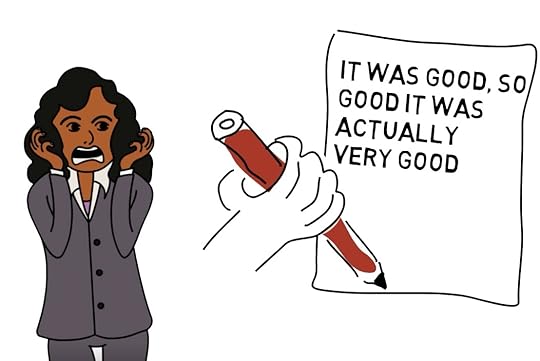
3) Bank raw writing
Capture your writing gems digitally and start to build up a bank or raw writing to use in the future.
Tip: dictate it from your handwritten ideas. I just email myself from my phone.

4) Block out time to write
Getting stuff out of your brain and onto a page is a cathartic process. Physically block some regular chunks of time out of your diary and protect them. You’ll only develop healthy writing habits by doing it regularly and consistently.
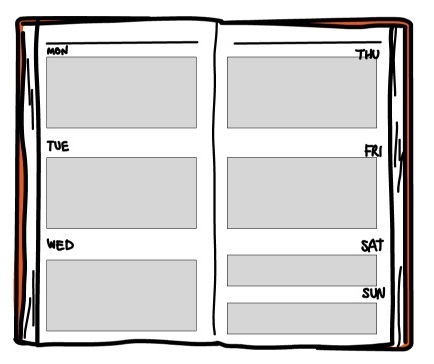
Stick to your times and even if you are in a creative trough, do ‘writing related activity’ (i.e. content planning).
You can get my FREE Creating a Content Calendar HERE to help you come up with ideas and organise your creativity to align with your business.
5) Show up with a positive attitude
If you show up for your writing time, telling yourself you can’t do it, that you’re writing is bad, that you have nothing worth saying, you will rarely

disappoint yourself!
Instead of focusing on the negatives, focus on the positive.
Tell yourself that you’re looking forward to some time with your own thoughts and your own creativity.
You’re looking forward to the space to be mindful. To think, get all the rubbish out of your head and free up your mind. To be able to express yourself.
Don’t Quit!
Remind yourself of those feelings of satisfaction when you write something you can be proud of!
For instant updates when I publish a new blog post, Follow me on Bloglovin’
For extra goodies and exclusive new information, join my mailing list HERE.
I only send a newsletter monthly so I won’t spam you, I promise!
The post How To Handle The Urge To Quit Your Blog appeared first on Amy Morse.
March 7, 2018
What’s the Difference Between Content and Copy?
I had a 1 to 1 meeting over a coffee last week with a new contact I’d made through networking. She told me how much she’d struggled with the content on her website.
When I dug into it with her, the thing she’d struggled with was the copy.
It’s hard talking about yourself in your business. I can certainly relate to this, having just completed the copy for my own new Learn To Love Your Words website!
The purpose of our copy is to sell ourselves.
Copy is a sales driven form of content.
We need to say what we do in a way that engages with our prospective customers, so we can generate leads.
It’s a tough skill to master. I admit, not one I’m accomplished at myself, which is why I’m not a copywriter.
Content contains the nutrients the Googlebot relies on to keep the internet alive.

Blogging, on the other hand, is a different from of content to copy.
Content is everything you create to tell the story of your business, and each type uses different skills, for example:
Content can be…
Videos and Audio
You need equipment and the skills to edit the material you record.
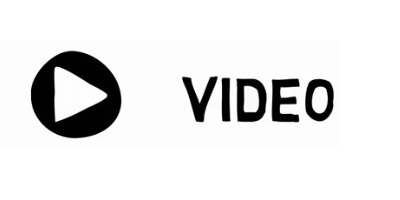
Images
You need graphic design skills, or illustration skills to create your own images or the knowhow to take, and edit, great photos (plus the equipment).
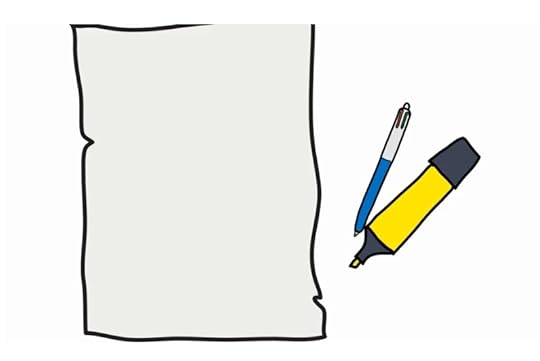
Blogging
Writing is something we can all do, but doing it well is another skill again.
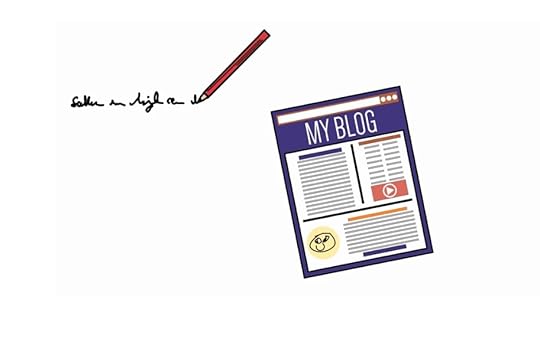
Recognising that you don’t have one skill, shouldn’t put you off using other skills. Just because writing sales copy was a challenge, does not mean that blogging will be too.
Blogging and copywriting are distinct disciplines, with their own ‘rules’ and techniques.
Blogging, however, is much more forgiving for an inexperienced writer than copywriting. Because, blogging is something you do frequently and, let’s be honest, when you first start blogging, the chances are, not many people will see your efforts. You’re not yet established as an authority, through your blogs, and the lack of volume of content will make your blog less appetizing for the Googlebot.
Your copy, however, is the first thing people read when they land on your homepage and want to understand the products or services you provide.
The ‘calls to action’ (where they go next) on your blogs will link back to your copy.
“The blog might bring people into your world, but your copy will convert them into paying customers!”
Blogging is a far more creative process. You can explore ideas, experiment, be a bit controversial, tell a story, be informal, be funny… be whatever helps your audience get to know you over time, get to like you, then get to trust you enough to follow the links that take them to your copy, to hand over their hard earned cash!
Educate, Entertain and Inform
I really struggled to write the copy for my website, agonised over it.
I get it.
But when it comes to content, in other words, sharing knowledge, expertise, passion and stories – especially through blogging, I’m never short of ideas!
Copy is sales driven content. Copy is where you explain what something is and move people further down the path to a sale. It’s static. It focusses on ‘what’ you do.
Content, generally, serves the purpose of educating, entertaining and informing people and a blog is a powerful and consistent way to share a chapter in the story of your business, week by week, month by month, year by year.
It focuses on ‘why’ you do what you do. On the benefits. The story. Your passion and your creativity. It’s fluid, constantly updating and changing through a linear narrative (on your blogs – the most recent article is first).
You can ‘edu-tain’ your audience with a blog and have a call to action that gives them something to do next, leading them to your copy.
‘Copy’ is a ‘type of content’ but is distinctive in its own right and takes a very different skillset – more of a marketeers’ skillset – to write than a blog.
I’m a storyteller, a weaver of words, with a background in training and empowering others. I don’t consider myself to be a ‘marketeer’, that’s why my work is about mentoring businesses to write content (blogs and books in particular) and not ‘copy’.
In essence the difference between ‘copy’ and ‘content’ is:
“To sell products and convince people to convert. Why write a blog post? Often, to educate an audience.”
I took this quote from this blog…
So, what are you waiting for?
Don’t be put off by the challenge of copywriting. Learn to love your words and embrace the joy and creativity of blogging. Grow your confidence and writing skills. Tell your story.
For instant updates when I publish a new blog post, Follow me on Bloglovin’
For extra goodies and exclusive new information, join my mailing list HERE.
I only send a newsletter monthly so I won’t spam you, I promise!
The post What’s the Difference Between Content and Copy? appeared first on Amy Morse - Authorpreneur.

